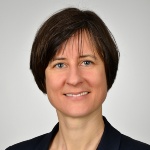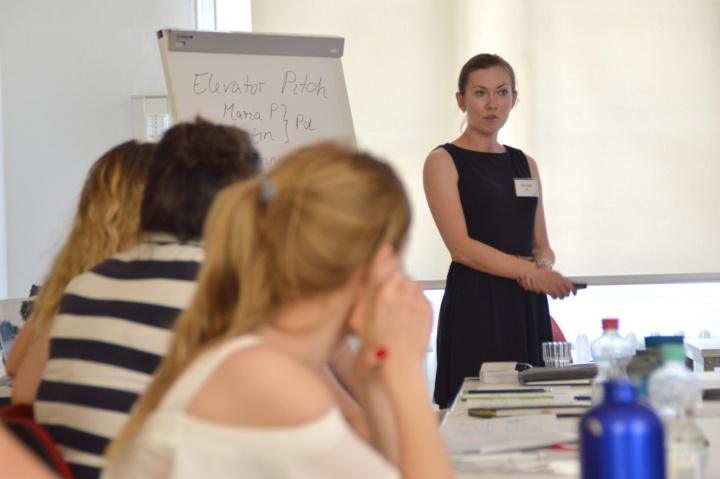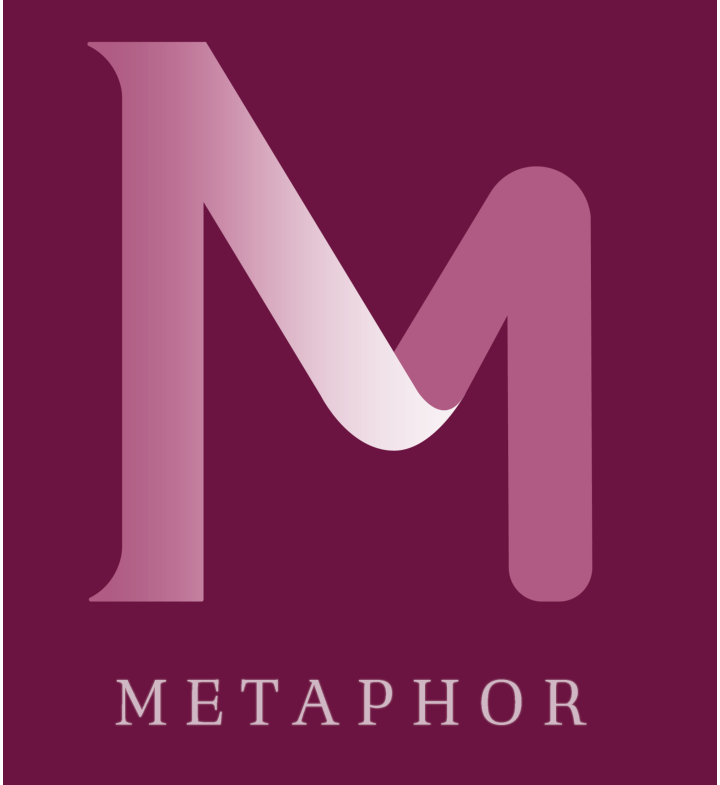Intonation and word order in majority English and heritage Russian across speaker populations
- Beginning
-
2018
- Funding Period
-
3 Years
- Principal investigator
- Project team
- Student assistants
-
Alina Schöpf
Marlene Boettcher, B. A.
- External cooperation partner
-
Dr. Tamara Rathcke, University of Kent at Canterbury
The project is part of the Research Unit "Emerging Grammars in Language Contact Situations:
A Comparative Approach" (RUEG): The project investigates non-canonical intonation in its relation to syntax (i.e., word order) and information structure (i.e., focus, givenness), focusing on the language contact involving Russian as heritage language and English as majority language. The project looks at the two languages of heritage speakers and compares them to monolingual native speakers, adopting a new approach in research on intonation in heritage languages. Moreover, it investigates intonation in formal vs. informal speech because we know from research on monolingual speech that there are phonetic correlates of register, which need to be differentiated from grammatical aspects of intonation. Finally, intonation will be investigated for different age groups, thereby addressing the question of how stable intonational differences are over (part of) the life span.
In line with RUEG’s overarching approach, the project investigates non-canonical prosody in three Joint Ventures (short: “JV”): addressing the systematicity of new intonational patterns (JVI: “Language Change Hypothesis”), their ccurrence at internal (syntax) versus external (information structure) interfaces (JVII: “Interface Hypothesis”), and, by including further comparisons beyond English-Russian contact, their contact-linguistic source in transfer or general contact-induced change versus language-internal dynamics or general developments (JVIII: “Internal Dynamics Hypothesis”).
International workshops organized by the project
February 21-23, 2021
RUEG online Conference “Dynamics of Language Contact – New Perspectives on Emerging Grammars, Variation and Change”
Organisers: Mareike Keller, Annika Labrenz, Katrin Neuhaus, Christoph Schroeder, Luka Szucsich
Scientific Committee: Artemis Alexiadou, Shanley Allen, Natalia Gagarina, Anke Lüdeling, Maria Polinsky, Shana Poplack, Christoph Schroeder, Luka Szucsich, Rosemarie Tracy, Heike Wiese, Sabine Zerbian
The RUEG online conference marked the completion of RUEG’s first 3-year-period. It aimed to bring together researchers from different fields who study the dynamics of language contact from a positive, multilingual perspective. The conference took place on Zoom and Gather.town and covered a broad range of topics on language contact phenomena from the point of view of linguistic systems and speakers.
The first day of the conference was connected with the International Mother Language Day and highlighted educational implications for multilingual settings. The second day was devoted to the topics of attrition vs innovation and transfer vs internal dynamics. The third day concentrated on the methods in research on patterns outside standard language. Additionally, on the third day of the conference all PhD students of RUEG presented their ongoing work in a form of posters.
More information about the conference can be found here: https://www.linguistik.hu-berlin.de/en/institut-en/professuren-en/rueg/conference2021
June 2019 - March 2020:
Yulia Zuban (P7,Universität Stuttgart) together with Maria Martynova (P3, Humboldt-Universität zu Berlin),Tatiana Pashkova (P2, Universität Kaiserslautern) and Vicky Rizou (P1, Humboldt-Universität zu Berlin) were the organizers and coordinators of the workshop (AG1) at the 42nd Annual Meeting of the German Linguistic Society (DGfS 2020) at the University of Hamburg.
RUEG-internal retreats and workshops attended by P7
26.10.2020 (online retreat)
Topic: Clause combining
During this workshop the RUEG group discussed frequencies, types and structure of finite subordination, frequencies and types of non-finite clauses and differences regarding the lexical type of connectors across different situations, speaker and age groups. The projects P7 and P3 gave a talk about the overall distribution of non-finite verbs (infinitives, converbs and participles) as well as their distribution across different situations in the data of three speaker groups (heritage speakers of Russian in the US and Germany and monolingual speakers of Russian).
03.03.2020 (Hamburg)
Topic: Discourse Markers
During this workshop the RUEG group discussed different kinds of discourse markers (lexical DMs, borrowed DMs, emojis, emoticons, three-dot-sign and onomatopoeia) and their distribution and position in the data of heritage and monolingual speakers of different age groups and across different situations. The projects P7 and P3 gave a talk about distribution, position and functions of the lexical DM “nu” and the borrowed DMs “ok, like, also” in the data of heritage speakers of Russian in the USA and Germany as well as Russian monolingual speakers.
02.03.2020 (Hamburg)
Topic: Follow-up proposal meeting
The goal of this retreat was to discuss the follow-up proposal in detail. This workshop was attended by the PIs of each project.
12.19 – 06.12.19 (Technische Universität Kaiserslautern)
Topic: Nominal Structure
This retreat was dedicated to the discussion of several areas related to nominal structure: case, gender and number, determiners, possessors, new vs. given referent marking, complexity of NPs, word order, types of NPs. Results were presented for relevant patterns related to nominal structure for each of the five RUEG languages. Yulia Zuban gave a talk on word order, information structure and intonation in heritage Russian in the USA. In particular, she presented her findings with respect to word order in heritage and monolingual Russian: Corpus 0.2.0; position of new referents: HSs_US and monolinguals; expression of contrast: HSs_US and monolinguals.
02.04.19 – 05.04.19: (University of Mannheim)
Topic: Central RUEG issues, transfer activities. Workshop Code-switching
This retreat was dedicated to the discussion of central RUEG issues and transfer activities. The PhDs, PIs and Mercator fellows discussed and planned RUEG-internal issues, i.e., DGfS 2020, Alberta, AIM, publications etc. Besides, the participants took part in the Workshop Code-switching, where different types of code-switching and clues to bilingual processing (cross-linguistic influence, contact-induced language change) were presented by Mercator fellows and invited researchers.
04.09.18 – 07.09.18: (University of Potsdam)
Topic: Uniformity across languages and countries. Data Collection Workshop. Transcription & Annotation Workshop
This retreat was dedicated to the discussion of challenges and solutions the elicitors might face when eliciting LangSit data. The projects discussed recruitment and scheduling of participants, consent forms, technical and language issues as well as the chitchats.
31.05.18 – 01.06.18: (University of Potsdam)
Topic: The contribution of P1-P7 projects to the joint empirical basis, research in collaboration with other projects, engagement with broader society
The whole group meeting was dedicated to the discussion of the collaborative research with other projects, i.e., distribution of data collection for pilot study, organization of retreats, lab exchanges, meetings with Mercator professors and mentoring of PhD students. The elevator pitch for planned dissertation of PhDs and research fields of potential additional mentors were discussed in the scope of RUEG expectations. Besides, the data collection strategy and the data treatment were discussed in detail, i.e., recruitment of participants, recording sessions, organization of travels, transcription, anonymization, alignment of data and annotations.
27.02.19 – 01.03.19: (University of Mannheim)
Topic: Transcription & Annotation Workshop, Part 3
During this workshop, the steps of POS tagging corrections, their annotation, problems and solutions have been outlined and discussed in coordination with other projects. Besides, the participants took part in the effective workflow of database normalization, its further development and improvement.
05.12.18 – 07.12.18: (University of Potsdam)
Topic: Transcription & Annotation Workshop, Part 2
During this workshop, the participants discussed first sets of transcribed samples and some problematic data. Besides, the universal transcription guidelines and the normalization guidelines have been further developed and improved. Further steps of annotation have been outlined.
06.09.18 – 07.09.18: (University of Potsdam)
Topic: Transcription & Annotation Workshop, Part 1
During this workshop, the participants practiced the synchronized transcription of given data using different computer software packages for the scientific analysis of speech as well as software tools for creating, managing and analyzing spoken language corpora.
Lab exchanges with members of RUEG
10.03 – 13.03.20: Meeting with Martin Klotz (Project Pd-1, HU Berlin)
Topic: Integration of the layers in the RUEG corpus
The goal of the meeting was to integrate the layers annotated by the project P7 into the next RUEG corpus release. Project P7 annotated heritage Russian in the USA and monolingual Russian as well as majority English by Russian heritage speakers and monolingual English for pitch accent placement, type and final boundary tone. Additionally, the data in Russian were annotated for information status. During the meeting the methodological issues of the data integration have been discussed since integration of the prosodic data in combination with other corpus layers is not trivial and presents some challenges. At the end of the meeting the first prosodic annotations have been successfully integrated into the corpus. Further steps will involve the integration of all annotated data and corpus search in order to answer the research questions of P7.
03.05.18: Meeting with Maria Pohle (Project Pd, University of Potsdam)
Topic: Methodological issues for the investigation of intonation and word order in majority English and heritage Russian across speaker populations
The meeting was dedicated to the discussion of methodological support in domains of data collection strategy, corpus building and architecture.
Meetings with the external cooperation partner
13.05.19 – 14.05.19: Meeting with Dr. Tamara Rathcke (University of Kent at Canterbury)
Topic: ‘Question intonation’
The meeting was dedicated to the discussion of question intonation by speakers of three groups: heritage Russian speakers with the majority language English, German, and the monolingual Russian control group. The transcriptive inventories (i.e., symbols for pitch accents, boundary tones etc.), their perceptual tolerance as well as the phenomena of truncation, downstep and upstep have been discussed during the effective workflow of data annotation.
27.04.18: Meeting with Dr. Tamara Rathcke (University of Kent at Canterbury)
Topic: ‘Russian intonation’
The meeting was dedicated to the discussion of Russian intonation and its transcription inventories (i.e., symbols for pitch accents, phrase accents, boundary tones) and their perceptual tolerance. Dr. Rathcke discussed a relevant phenomenon of truncation in Russian intonation. in her presentation 'Autosegmental-metrical approaches to modelling Russian intonation: Evidence and issues'
Summer school
08.19 – 16.08.19: RUEG Summer School (Humboldt-University, Berlin)
PhD student Yulia Zuban visited the RUEG lectures on language contact, language acquisition, corpus linguistics, heritage languages and registers. The lectures enabled the listeners to acquire useful experience in analyzing the language contact involving different languages and provided the background for adopting new approaches in research on heritage languages.
Data collection
27.02.19 – 31.03.19: Second data collection in the USA
Recruitment of heritage Russian speakers through social networking services (Facebook, CouchSurfing, Craigslist, etc.), Russian language meetups, language exchange meetups (Mundo Lingo etc.), Russian day care centers, shops, restaurants, supermarkets, libraries, students clubs in New York City (NYC). Data elicitation from the older speaker group (22-36).
Call for bilingual participants (22-36)
24.09.18 – 25.10.18: First data collection in the USA
24.09-04.10: Recruitment of heritage Russian speakers through Russian schools, churches, kindergartens, cultural institutions in the Greater Washington area (Virginia, DC, Maryland, Baltimore). Data elicitation from the younger speaker group (14-17).
Medienberichte
RBB Kulturradio (19.12.2017) „Grammatik im Wandel – Wie Zweisprachigkeit Sprachen ändert“
- Zuban, Y., Rathcke, T & S. Zerbian. (2020). Intonation of yes-no questions by heritage speakers of Russian. In Proceedings of 10th Speech Prosody, Tokio, Japan, 96-100.
- Böttcher, M. & Zerbian, S. (2020). Stressed Pronouns in Spontaneous English, In Proceedings of 10th Speech Prosody, Tokio, Japan, 131-135.
- Zerbian, S. & M. Böttcher. (2019). Stressed pronouns in mono-and bilingual German. In Sasha Calhoun, Paola Escudero, Marija Tabain & Paul Warren (eds.) Proceedings of the 19th International Congress of Phonetic Sciences, Melbourne, Australia (pp. 2640-2645).
- ‘Grammatische Kombiniererinnen: Linguistinnen sind Sprachveränderungen bei bilingualen Menschen auf der Spur‘, in a journal "Forschung & Leben" (University of Stuttgart)
Colloquium:
06.01.2021 Colloquium of Slavic Linguistics at the Humboldt University of Berlin
Topic of the presentation:
“Word order in heritage Russian: majority language and clause type matter” (Yulia Zuban, Maria Martynova, Luka Szucsich, Natalia Gagarina, Sabine Zerbian)
Zuban, Yulia (P7) and Maria Martynova (P3) gave a talk about the distribution of different word orders produced by adolescent heritage speakers of Russian residing in the USA and Germany as well as monolingual speakers of Russian. Heritage speakers in Germany were found to be similar to the monolingual speakers. Heritage speakers in the US differed from both monolingual speakers and heritage speakers in Germany by producing significantly more SVO orders in embedded clauses. In main clauses, however, heritage speakers in the US behaved similarly to two other speaker groups. The results of the study are discussed with the reference to the differences in majority languages of the heritage speakers as well as the differences between main and embedded clauses.
Conferences:
-
21.02-23.02.2021 RUEG online Conference (https://www.linguistik.hu-berlin.de/en/institut-en/professuren-en/rueg/conference2021)
Topic of the conference: ‘Dynamics of Language Contact – New Perspectives on Emerging Grammars, Variation and Change’
Topic of the poster: Word Order in Heritage Russian in the US: clause type matters (Yulia Zuban, Sabine Zerbian)
Yulia Zuban presented a poster on the word order patterns produced by the heritage speakers of Russian in the US and monolingual speakers of Russian. The results of the study showed that heritage speakers generally produced significantly more SVO orders. Split of the clauses into main and embedded revealed further interesting results. In main clauses heritage speakers and monolinguals were similar to each other. In embedded clauses, however, heritage speakers significantly differed from monolinguals by predominantly producing SVO orders. The increased frequency of SVO in embedded clauses was discussed with the reference to a strategy of choosing one word order from many available under language contact (“narrowing of options” by Heine 2006) as well as with respect to the differences between main and embedded clauses.
- 04.03 – 06.03.20: 42nd Annual Meeting of the German Linguistic Society (DGfS 2020) at the University of Hamburg.
Topic of the conference: ‘Linguistic Diversity: Theories, Methods, Resources’
Topic of the presentation: “Intonation of yes-no questions by heritage speakers of Russian” (Yulia Zuban, Tamara Rathcke ,Sabine Zerbian).
Zuban, Yulia (P7) gave a talk about intonation patterns of yes-no questions produced by Russian heritage speakers residing in the USA and Germany and monolingual Russian speakers from Saint Petersburg. Heritage speakers of both groups were found to differ significantly from monolinguals regarding some aspects (e.g., number of pitch accents). Besides, two groups of heritage speakers differed from each other with respect to the final boundary tone in one of the tested conditions. The results were discussed with the reference to the previous findings.
- 08.19 – 09.08.19: The 19th International Congress of Phonetic Sciences ICPhS (Melbourne, Australia)
-
Topic of the conference: ‘Endangered Languages, and Major Language Varieties’
Topic of the presentation: “Stressed Pronouns in German Mono- and Bilingual Speech”, Bild1, Bild 2, Bild 3
At the conference, Prof. Dr. Sabine Zerbian and Marlene Böttcher introduced the Research Unit "Emerging Grammars in Language Contact Situations" to a broad audience. They presented their original work on stressed pronouns in mono- and bilingual German based on the data collected within the project at the first stage in the research process. The eye-catching results and observations led to thought-provoking and interesting discussions among researchers interested in phonology.
- 06.19 – 28.06.19: The 12th International Symposium on Bilingualism (University of Alberta, Edmonton, Alberta, Canada)
Topic of the conference: ‘The Next Generation’
Topic of the presentation: :“Emerging Grammars for Referent Introduction in Heritage Speakers’ Two Languages”
Zuban, Yulia (P7) and Tatiana Pashkova (P2) gave a talk on referent introduction in the heritage and majority language of bilingual speakers, discussing their contact-linguistic implications. Greek and Russian as heritage languages in Germany and the U.S., and English across bilingual speakers in the U.S., in addition to monolingual controls.
Courses:
- WS2020/21. Language & Cognition: Heritage Languages (LA Bachelor / LA GymPO; BA (alt) HF; BA (neu); Technikpäd.). Lecturer: Prof. Dr. Sabine Zerbian
- SoSe 2018. Advanced Phonology: Intonation in Language Contact (LA Bachelor / Master /GymPO; BA HF; MA Angl.; MA Wi.päd.) Lecturer: Prof. Dr. Sabine Zerbian
MA / BA Theses:
- Ivashchyk, Yuliia. 2020. Word order in Heritage Russian in the US. MA Thesis. University of Stuttgart.
- Böttcher, Marlene. 2019. Stressed pronouns in English. BA Thesis. University of Stuttgart.
- Maier, Daniele Alexander. 2019. Alignment of prenuclear rises in dominant English by heritage speakers of Greek. MA Thesis. University of Stuttgart.
- Wandrei, Alina. 2019. Herkunftssprache Russisch in Deutschland. BA Thesis. University of Stuttgart.
- Herrmann, Jelena. 2018. Phonology of Code-Switching: A study of Russian-German bilinguals. MA thesis. University of Stuttgart.
- Metaphor Academic Center for Russian Language & Culture (Address: 7000 Arlington Blvd Falls Church, VA 22042). The institution rendered the project assistance in recruitment and scheduling of participants as well as provided the working spaces for data elicitation.
Further information

Yulia Zuban
M.A.Research Associate (Project RUEG P8)

Sabine Zerbian
Prof. Dr.Professor English Phonology



